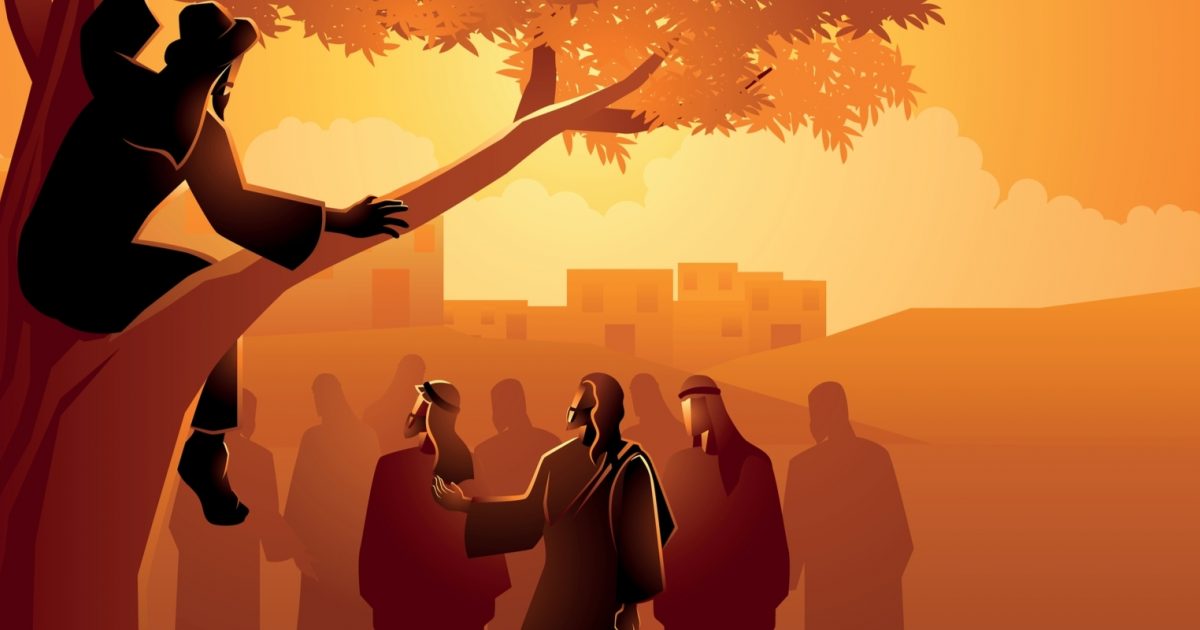
Nov. 15, 2022 – Luke 19:1-10
Immediately after the healing of the blind man, we find one of the most beautiful episodes in Luke’s Gospel: the instant conversion of the publican Zacchaeus.
Toward the end of the journey to Jerusalem, Jesus passes through the border town of Jericho. In that town there is a man named Zacchaeus who is not only a publican but also the leader of the publicans, which means he is rich. Zacchaeus wants to see Jesus, but because he is short he cannot see past the crowd, so he climbs a tree. When Jesus arrives at the place where Zacchaeus climbed, he calls him and invites himself into his house, which at the same time cheers Zacchaeus but scandalizes the crowd, because they know Zacchaeus is a sinner.
To better understand this Gospel page, it is very important to reflect these elements:
– “Zacchaeus”: Jesus calls him by his proper name.
– “Climb the Tree”: to overcome the obstacles of our littleness.
– “Come down”: it is as if he were saying to him, “Come back to the ground, adhere to the earth: the extraordinary served you for a moment, but now return to your everyday condition, to your small stature!”
– “Now, quickly”: there is no time to waste, the opportunity is to be grasped without delay!
– “Today”: not yesterday nor tomorrow. This adverb is a key word in Luke, from the birth of Jesus when the angels announce to the shepherds, “Today, in the city of David, a Savior has been born to you, who is Christ the Lord” (Lk. 2:11); to the beginning of his public activity, when in the synagogue in Nazareth he delivers that very brief homily: “Today this Scripture is fulfilled in your ears” (Lk 4:21); then, a few more times, until the hour of the cross, when Jesus says to the “good thief,” “Today with me you will be in paradise” (Lk 23:43). We also meet Jesus today!
– “I must, it is necessary”: another key word in Luke (impersonal verb deî, which appears 18 times in this gospel, from Lk 2:49 to Lk 24:44). It expresses the way in which Jesus, in his full freedom, goes to meet the human and divine necessity of passion, fulfilling God’s will of salvation for all people.
– “Stopping” does not indicate a quick stop, but ménein, that is, “abiding, dwelling” with you. The same occurs for the Risen One with the disciples of Emmaus.
– “In your house”: entering another’s house means sharing intimacy with him; specifically, Zacchaeus being a public sinner, this self-invitation of Jesus means compromising scandalously with his sin.
Good workers…
– We, too, want to see Jesus in the deepest possible sense. Only then can we truly become his disciples. We need to be told, “I want to stay at your house today.” Let us open the door and welcome him.
– We must be careful not to judge people by their appearance, their past, their social standing or their occupation.
– According to the Gospel of Christ, you have to believe in your conversion, you have to believe that you can change, you have to believe that the past is not a destiny.
To those who asked him, “Abba, what are you doing today?”, Anthony, the monks’ father, now in his nineties replied, “I am starting over today.” Jesus’ encounter with Zacchaeus teaches us that today it is always possible to begin again. Nothing and no one can oppose God’s forgiveness in Jesus Christ, which enables us to begin again every day. (St. Ambrose: Exposition of the Gospel according to Luke 8:86)
P Joby Kavungal RCJ

